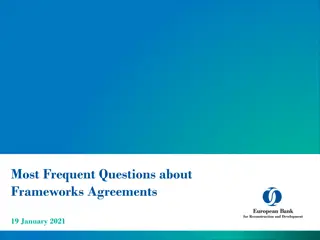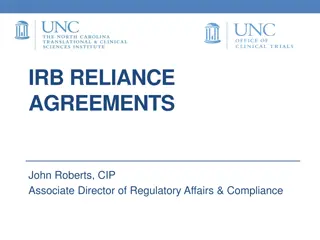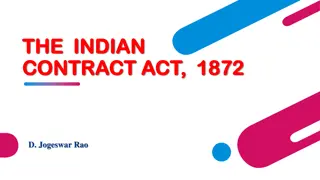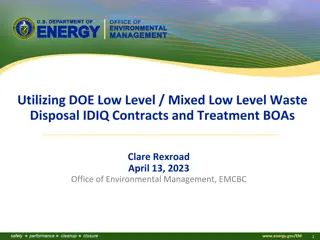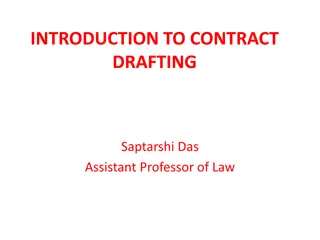
Indian Contract Act 1872: Essential Elements and Classification
Explore the Indian Contract Act of 1872, diving into the essential elements of a valid contract such as offer, acceptance, legal relation, capacity, free consent, object lawfulness, consideration, and more. Learn about contract classification based on execution and enforceability criteria. Grasp the nuances of valid, void, voidable, illegal agreements, and the creation of contracts through express and implied means.
Download Presentation

Please find below an Image/Link to download the presentation.
The content on the website is provided AS IS for your information and personal use only. It may not be sold, licensed, or shared on other websites without obtaining consent from the author. If you encounter any issues during the download, it is possible that the publisher has removed the file from their server.
You are allowed to download the files provided on this website for personal or commercial use, subject to the condition that they are used lawfully. All files are the property of their respective owners.
The content on the website is provided AS IS for your information and personal use only. It may not be sold, licensed, or shared on other websites without obtaining consent from the author.
E N D
Presentation Transcript
BUSINESS LAW INDIAN CONTRACT ACT, 1872 Agreements and Contracts
INTRODUCTION All of us enter into various kinds of agreements in our daily lives knowingly or unknowingly Agreement = Offer + Acceptance CONTRACT= Offer + Acceptance+ Enforceability OR Agreement+ Enforceability For an agreement to become enforceable in the court of law, the following elements must be satisfied
ESSENTIAL ELEMENTS OF A VALID CONTRACT 1. Offer 2. Acceptance 3. Legal Relation- (Balfour V Balfour) 4. Capacity :- A. Major B. Sound Mind C. Not disqualified from any law to enter into a contract 5. Free Consent A. Coercion B. Undue Influence C. Fraud D. Misrepresentation E. Mistake
6. Object must be lawful A offers to pay Rs. 10,000 to cause injury to C 7. Consideration Something in return. Cash or kind 8. Agreements must not be void (nullity) e.g. Agreement with a minor 9. The agreement must be capable of performance e.g. A promises to B to get the Eiffel Tower to Mumbai 10. Legal formalities E.g. for purchasing a house all documents to be in place, registration to be completed etc.
CLASSIFICATION OF CONTRACT {I} ON THE BASIS OF EXECUTION A) Executed contract- Both parties have performed e.g. X sells his laptop to Y and Y pays the money to X B) Executory contract- Both the parties are yet to perform their promise e.g. C promises to sell his I phone to D on 29 June and D promises to pay the money on 30 June C) Partly executed and partly executory :- one party has performed and other is yet to perform For e.g. A sells his watch to B where the watch is handed to B immediately but B will pay money after a month
II) ON THE BASIS OF ENFORCEABILITY A) Valid contract- all essential elements are satisfied B) Void Contract where the parties are not able to perform their part of promise may be due to a change in law C) Void agreement an agreement with a minor is void ab initio D) Voidable agreement valid unless avoided , can be avoided only by the innocent party E) Illegal agreement X enters into an agreement with Y to kidnap Z for which X pays Rs. 1 lakh to Y is an illegal agreement F) Unenforceable contract
III) ON THE BASIS OF CREATION OF CONTRACT a) Express Contract either written or by spoken words b) Implied contract- e.g. Obtaining cash through the ATM c) Contingent contract- due for performance on the happening or non happening of a particular event e.g. Contract of Insurance d) Quasi contract- like contract
DISTINGUISH BETWEEN AGREEMENT AND CONTRACT Points of distinction Meaning Creation of legal Obligation - Scope Essentials Nature-Every contract is an agreement, but every agreement is not a contract Example
THANK YOU





